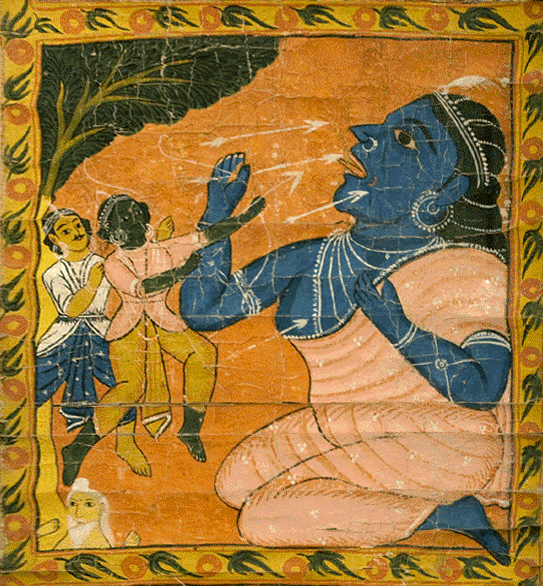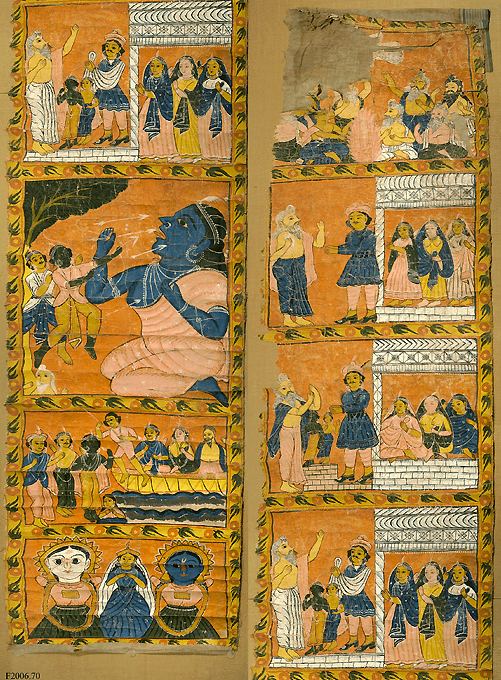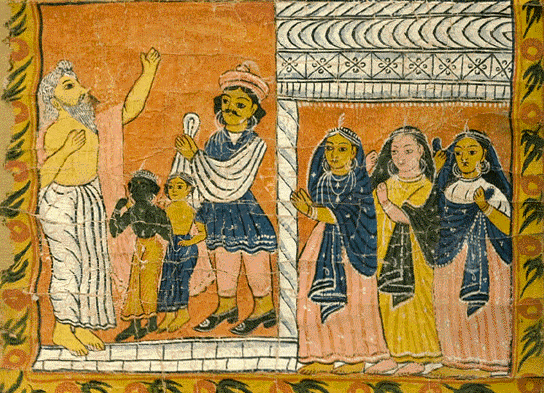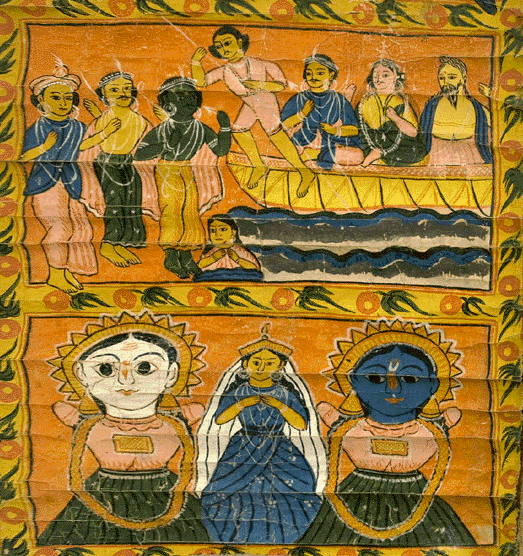
|
|
|
|
BY: SUN STAFF

Stories of Rama's Youth Feb 17, 2012 — CANADA (SUN) — A serial presentation of Tulasi das's 'Ramacaritamanasa'. [Caupai 94] As was the bridegroom, so was the procession. All kinds of games they played as they marched along the road. Meanwhile, Himalaya had erected a pavilion more wonderful than tongue can tell. To all the hills, great and small, that there were in the world – more than can be numbered – and to all the woods and seas, river and ponds, the Mountain King sent an invitation. They all came to Himalaya's palace, assuming whatever fair forms they wished together with their retinues and noble wives, and lovingly sang songs of blessing. The king had already prepared a number of guest-chambers, and in them all the guests were lodged, each according to his degree. Compared with the beauty and splendor of the city even Brahma's creative craft seemed mean. [Chanda 8] Poor indeed seemed Brahma's creative craft when one looked at the beauty of the city. The woods, the gardens, wells and ponds and streams were all more lovely than words can tell. Many were the festive triumphal arches; every house was decked with flags and banners; so handsome and accomplished were the men and women that even the hearts of sages were fascinated by the sight of their beauty. [Doha 94] Can that city be described in which the Mother of the world became incarnate? There success, prosperity, wealth and happiness ever abounded in fullest measure.

[Caupai 95] When tidings came that the procession was approaching the city, there was a stir in the town and its beauty was enhanced. The party of welcome adorned and made ready a number of carriages and went out to meet the guests with due respect. They rejoiced to see the host of gods, and when they saw Hari, they were overjoyed. But when they beheld Siva's troops, all their steeds took fright and ran away. The elders plucked up courage and stayed where they were, but the children all fled for their lives. When they reached the homes and their parents asked them what was the matter, they trembled for fear and replied, 'What can we say? It's unspeakable! Is this a marriage-procession or the army of the god of death? The bridegroom is [ ] riding on a bull; serpents and skulls and ashes are his ornaments! [Chanda 9] 'Ashes and serpents and skulls are his ornaments: he's naked, with matter hair – a fearful sight! With him are ghosts and spirits and goblins and witches and demons, hideous to behold! Whoever looks on that procession and lives must be a very model of piety, and only he will see Uma's wedding!' That is what the boys were saying in every house. [Doha 95] But the fathers and mothers all realized that it was Mahesa's retinue and smiled; they did their best to reassure their children, saying, 'Don't be afraid; there's nothing to fear.' [Caupai 96] Those who had gone to meet them brought in the procession and assigned magnificent guest-rooms to every guest. Maina made ready the festal lamp and the women with her sang songs of glad welcome. In her fair hand she held the golden platter and joyously went to wave the lamp round Hara's head. But when they saw Rudra's dreadful guise, the women were terrified and fled in utter panic into the palace. Mahesa moved on to the guestrooms. Maina was very sad at heart; she sent for Parvati, and taking her very affectionately on to her lap, with her dark lotus eyes filled with tears, she said, '[What] has that fool of a Brahma, who has bestowed on you such beauty, given you [ ] for a husband?
 [Chanda 10] 'Why has Brahma, who made you so beautiful, given you a madman to wed? The fruit that should grow on the tree of Paradise is forced to grow on a mere acacia! I'll hurl myself and you from a cliff, I'll burn us both in a fire or leap with you into the sea, but, come ruin, come ill-fame, I'll never let you marry this fellow while I live!' [Doha 96] All the women were distressed when they saw the queen so sorrowful. Maina, for love of her daughter, wept and lamented, saying, [Caupai 97] 'What harm had I done to Narada that he should ruin my happy home and advise Uma to do penance to win [such a] husband? Truly he knows no passion, nor is he led astray by desire; for he is an eremite, without money, home or wife; therefore he is neither ashamed nor afraid to bring another's house to ruin. Can a barren woman know the pains of childbirth?' When Bhavani saw her mother so distraught, she spoke gentle words of wisdom: 'Grieve not, my mother, but remember that the designs of fate cannot be annulled. If it is written in my destiny that I should wed [him], then why should anyone be blamed? Mother, can you erase the lines that fate has drawn? Bring not reproaches on your head for naught!
 [Chanda 11] 'Mother, bring not reproaches on your head; cease your laments; this is no fitting time for tears. The joy and sorrow written on my forehead I shall experience wherever I may go.' Hearing Uma's modest and tender words, all the women grieved and, bitterly weeping, cast many a reproach on fate. [Doha 97] Just then came Himalaya with Narada and the Seven Seers right speedily to the palace; for they had heard the news. [Caupai 98] Then Narada explained and told to all the story of Parvati's former life. 'Hearken, Maina,' he said, 'to the truth I tell. Your daughter is Bhavani, Mother of the world. She is without birth or beginning, Siva's immortal consort, ever dwelling in Sambhu as one-half of him. She creates the world, preserves and dissolves it, and of her own will assumes an illusory body. First she went to take birth in the house of Daksa, and became a beautiful maiden named Sati; and there Sati married Samkara, as the whole world knows well. One day as she was walking abroad with Siva, she saw the sun of the lotus race of Raghu; in her folly she heeded not Siva's words, but stupidly took the form of Sita. [Chanda 12] 'Sati took the form of Sita, and for that sin Samkara deserted her; and when she was separated from Hara, she went to attend her father's sacrifice and was consumed in the sacrificial fire. Now she has been born in your house and has undergone severe penance to win her husband. Know this and lay aside your doubts. Girija is forever Samkara's beloved spouse.'
| |